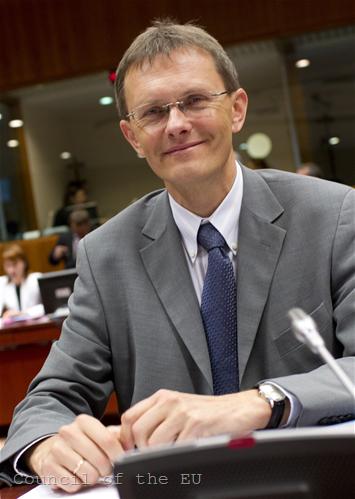Latvia Advises: Use Your Heads and Do Not Listen To Nobel Laureates
Adelina Marini, February 27, 2013
 Next week Latvia will officially apply for membership in the eurozone. Like the lonely Croatian EU accession, Riga's decision will hardly be an occasion for the red carpet and many fanfares, but the difference between the two lonely long distance runners (Croatia toward the EU and Latvia toward the eurozone) is that Latvia's determination rather causes admiration. Admiration that after the severe economic and financial crisis of 2009 when the Latvian gross domestic product collapsed by 17.7%, the country again is the fastest growing economy in the entire European Union.
Next week Latvia will officially apply for membership in the eurozone. Like the lonely Croatian EU accession, Riga's decision will hardly be an occasion for the red carpet and many fanfares, but the difference between the two lonely long distance runners (Croatia toward the EU and Latvia toward the eurozone) is that Latvia's determination rather causes admiration. Admiration that after the severe economic and financial crisis of 2009 when the Latvian gross domestic product collapsed by 17.7%, the country again is the fastest growing economy in the entire European Union.
According to the winter forecast of the European Commission, Latvia's economy continues its steady pace in 2012 as well, in spite of the crisis environment around the country, scoring growth of 5.2% which is a very slight slowdown compared to 5.5% in 2011. This year growth is also expected to slowdown to 3.8% due to the weakening effect from the favourable weather and the exceptionally good agricultural harvest last year. In 2014, however, the Commission expects again an upsurge of economic expansion with growth of 4.1%, driven mainly by growing external demand. In 2013 and 2014 the main growth drivers will be domestic demand and exports. The Commission's conclusion is that the Latvian economy will continue to be the fastest growing as the risks for the forecast are only balanced.
The budget targets are not only being implemented, but are even overmet, the Commission reports. In 2012 the government has succeeded in reducing the budget deficit much more than initially planned - 1.5% of GDP. Public debt is expected to rise this year to 44% of GDP, but will start declining in 2014 to 42%. Last year the government paid in advance part of its loan to the IMF. In 2008, the EU and the IMF approved a bailout programme amounting to 7.5 billion euros of which the European community's contribution is 3.1 billion and the IMF's - 1.7 billion. With bilateral loans got involved also Sweden, Denmark, Finland, Norway and Estonia (1.9 billion) and the World Bank with 0.4 billion. Loans provided also the European Bank for Reconstruction and Development, the Czech Republic and Poland totally amounting to 0.4 billion.
What is the recipe?
On the eve of the launching of the procedure of approving Latvia's application for membership in the Economic and Monetary Union, in the economic affairs committee of the European Parliament appeared Andris Vilks, Latvia's finance minister, and Ilmars Rimsevics, the governor of the central bank of Latvia. Mr Rimsevics's recipe consists of several simple words, as he explained: speed, ownership, commitment, solidarity and partnership with the social partners. These conditions points in the IMF blog Olivier Blanchard too, chief economist of the International Monetary Fund. According to him, a key factor for Latvia's success is the ownership of the rescue programme, meaning the availability of a clear exit strategy and a long-term goal of joining the eurozone which are not imposed externally.
Olivier Blanchard admits on the occasion of the lessons from Latvia that he doubted the success of the rescue programme because Riga insisted on keeping the peg with the euro. According to him, this was a recipe for disaster. Instead, the Latvian government decided to cut fast and deep by adopting urgent and broad fiscal consolidation, exceeding 17% of GDP. The government's insistence to keep the peg with the euro, thus depriving itself of the possibility of a sharp nominal depreciation, is due mainly to fears that this would have an imminent effect on domestic loans 90% of which are denominated in euro.
And last but not least, it is important to use your heads, Ilmars Rimsevics recommended. Less listening to Nobel laureates in economics and more thinking, was the piece of advice of the Latvian central banker.
The key is communication
According to Minister of Finance Andris Vilks, the main thing is to act quickly and decisively by in the same time maintaining solid communication as with the social  partners so with the citizens. They trusted the government twice by re-electing it. In the mouths of the two Latvians the solution sounded easy, but for many MEPs, especially from peripheral countries, it seemed difficult or even impossible. But Latvia believes that the healthy combination is between austerity measures and growth-friendly measures. And one more thing which is very important - reforms should never stop. Mr Vilks explained that citizens themselves and entrepreneurs insisted on reforms to continue in education, healthcare, labour market.
partners so with the citizens. They trusted the government twice by re-electing it. In the mouths of the two Latvians the solution sounded easy, but for many MEPs, especially from peripheral countries, it seemed difficult or even impossible. But Latvia believes that the healthy combination is between austerity measures and growth-friendly measures. And one more thing which is very important - reforms should never stop. Mr Vilks explained that citizens themselves and entrepreneurs insisted on reforms to continue in education, healthcare, labour market.
The figures for Latvia in the winter forecast of the Commission speak for themselves. Unemployment, which is rather high, has dropped by 2.8% last year - from 16.2 in 2011 to 14.9 per cent. An important element of the expansion of the labour force last year is the significant decline of the emigration flow. According to preliminary data of the Latvian statistics office, the long-term net emigration has contracted notably in 2012 to levels even lower than the 2000-2007 period when the economy was growing by double digits.
Nonetheless, why membership in the euro area?
This is the question that entertained not one or two MEPs against the background of the eurozone troubles. There is a global unanimity that the worst of the eurozone debt crisis is in the past, but the elections in Italy are capable of refuting these sentiments. Ilmars Rimsevics explained that Latvia of today is very much different than the past and its success is sustainable, at least because the crisis has left deep scars in the Latvians' minds which will stay there for generations. In other words, reforms will continue even if there are future crises because Latvia now is much better prepared for them than before. Latvia has pegged its lat to the SDR basket in 1993 and since 2005 it has been pegged to the euro, precisely as the Bulgarian lev. In spite of the many fluctuations, crises, ups and downs, the central bank has managed to keep the peg.
Latvia's central governor seemed sad that the country will have to say good bye to the lat, but he said that for a small and open economy as the Latvian it is better to be in a bigger union where it will more easily resist speculative pressure. The country has been fulfilling the Maastricht criteria since September 2012. Ilmars Rimsevics believes that Latvia's accession will be a positive message that the worst of the crisis in the eurozone is behind us and that the EMU still is an attractive club. Latvia is ready to share solidarity with the rest and also to share its experience. Now is the right time, Mr Rimsevics is convinced.
But Latvian citizens do not share his opinion. An opinion poll of the central bank from August last year shows that only 13% of the respondents want the euro to be introduced as soon as possible. Almost 22 per cent do not support its introduction in the next few years, while 59% are totally against the single currency. The Latvian edition being made together with The Economist, the IQ The Economist, points out that it is in the Latvians' nature to have a negative attitude toward all political issues. Besides, the edition writes, they have no problem living with two contradicting things simultaneously.  The public may be sceptic in terms of the euro, but instead the rating of Prime Minister Valdis Dombrovskis is record high. Moreover, the opposition decided that it is better to endorse the euro rather than fighting it.
The public may be sceptic in terms of the euro, but instead the rating of Prime Minister Valdis Dombrovskis is record high. Moreover, the opposition decided that it is better to endorse the euro rather than fighting it.
Latvia is ready to accept the single supervisory mechanism as well, the details of which are being hammered out, but it is scheduled to enter into force on March 1st 2014, two months after Latvia's accession in the eurozone. MEPs were also worried by the availability of huge amounts of non-resident deposits in Latvia, especially of citizens of Cyprus. Governor Rimsevics explained, however, that the quantity of Cypriot deposits amounted to 600 million euros which is not worrying. According to the tradition, the normal level of foreign deposits in the country is around 40-50%. Rimsevics firmly denied Latvia to have turned into business attracting foreign money. He added that the banking system was well prepared to accept the euro because the country was following the example of neighbouring Estonia which joined the single currency on January 1st 2011.
In spite all this, Latvia seems steadfast in its decision to join the euro area. The Commission has to present in the Council a convergence report and only then a decision will be made. Will the small Baltic state bring new energy and new strength in the exhausted zone of the single currency, it is difficult to forecast mostly due to the uncertainty the outcome of the elections in Italy bring, where not even one political force managed to win a convenient majority. The big surprise there is the anti-euro former comedian Beppe Grillo who emerged as a third political force in the country.
 Klaus Regling | © Council of the EU
Klaus Regling | © Council of the EU Mario Centeno | © Council of the EU
Mario Centeno | © Council of the EU Mario Centeno | © Council of the EU
Mario Centeno | © Council of the EU